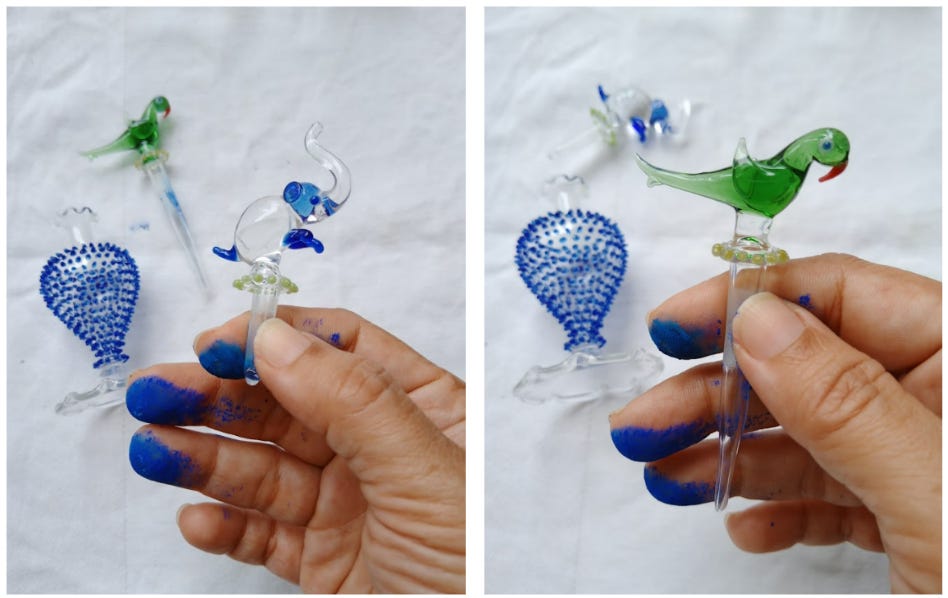Reparation(Soap) For All
Newsletter 5.2023

Is love…a Soap?
As someone steadily recovering from post partition inter-generational scarcity-mindset, I have cultivated a practice of indulgence and leisure. Some years back, when I lived in Singapore as an art critic on a slim budget, I splurged on an expensive box of freshly made cocoa-dusted mochi from a Japanese confectionery store. I ate just one piece and hoarded the rest in the fridge until it got fungus. My German friend and flatmate at the time laughed and asked what I was saving the box for, and I blurted out: “for…bad times…?”
I still feel so stupid about this. Years later, and much to my surprise, I have found that this urge to hoard something nice is a common condition among those who acquire my work but abstain from enjoying it! I first noticed this “issue” in 2021 with my co-curator on Bagh-e Hind who thought the unique edition octagonal garden-fountain-feature-soap that I had made for him was “too beautiful to use”. I got so angry I made him a whole new octagonal soap and labelled it as his piece to hoard, or put on a pedestal and stare at!
But over the year that followed, I kept hearing the same thing:
-The incense was bought but never opened out of its sleeve and lit. The soap was displayed in a dish and was stared at for a full year.
-The solid perfume in the silver pillbox, packed in the silk pouch that I stitched, was adored from afar until its fragrance completely evaporated.
-The edible perfume was not savoured till it went stale.
This year I have made it a point to remind everyone to please indulge in small pleasures, whether it’s using my soap or perfume or just buying themselves flowers for no reason.
Occasionally, those I love might find a surprise-soap-parcel in their mail.
Decolonisation in 2 minutes!
Last month, I was interviewed by Nitasha Manchanda, a Boston based gardener-scientist, on my evolution from an artist to a critic to a perfumer. The Indian Edit podcast spotlights women who have innovative creative practices that link to the subcontinent. For well over an hour and through lots of laughs, Nitasha lead with questions on the many facets around my background from Lagos to London to Singapore to India that shaped my tropical salty-sweet characteristics and exciting (non)career. In my conversation, I also attempt to define what I mean by “luxury communism” in conceptual and practical terms.

Curatorial Tours: In the last month, my guests were James Wescoat who was already familiar with my colleague Nicolas Roth’s research; and William Tullett who has written about our sensorial methodology in the recent issue of American Historical Review. Wescoat is widely known for leading the Smithsonian project Garden, City, and Empire: The Historical Geography of Mughal Lahore, as the Aga Khan Professor Emeritus of Landscape Architecture and Geography at MIT. Additionally, as advisor to the Indian Institute of Science Education and Research (IISER) in Pune, he is a regular visitor to my city, which made for an excellent reason for me to reach out and share our sensory project.
I still receive gasps and raised eyebrows from my academic guests, which informs me that my concept continues to hold up and will evolve brilliantly in decades to come. It also means I will become more and more insufferable as I stride swiftly into my era of genius. #NoRegrets

Reparations for all
I am now among the few in the art world to openly reject the premise of “decolonisation” because the Museum is the Vampire’s Castle from which we must escape.
What I am keen on is a practical politics of joy and delight and how reparations can literally mean the freedom to take a perfumed nap, unbothered by “expectations, burdens and obligations”. You and I can indulge in perfume, incense and soap instead! Let us redefine what history means in tangible ways beyond the censorship and reach of the authority.
Pictured: “Bagh-i Babur” soap-translation of Narcissus chapter of Bagh-e Hind; stuffed with vetiver roots, dusted with gold pigment and stamped with a verse by 18th century poet Mir Taqi Mir as selected (and translated) by my colleague Nicolas Roth: “So intimate have we become with the colour and fragrance of this garden’s flowers; That filled with desire we roam with the breeze, becoming just like the wind”
Over the coming months, I will be continuing my exploration of 17th and 18th century paintings that are not in the public domain, and make them accessible to those in the subcontinent by way of soap-translations that double as reparations the public can possess, hold and take pleasure in.
Perfume of the Season: “Rose”




